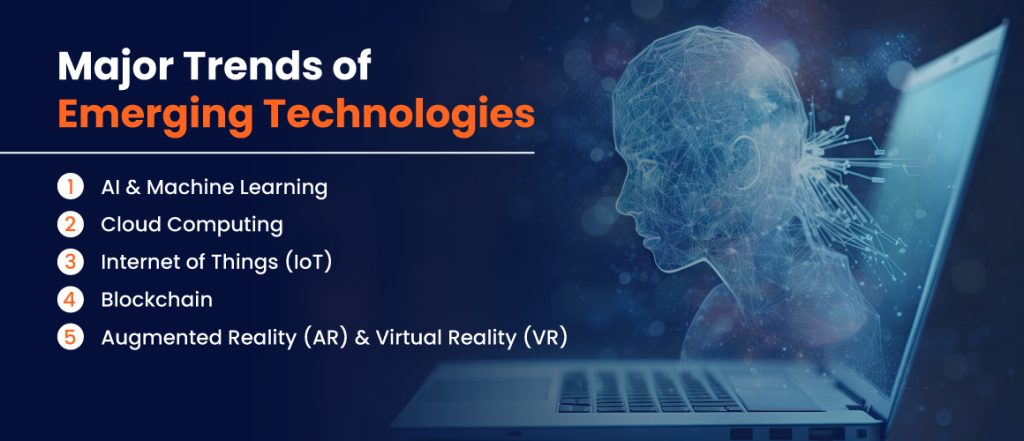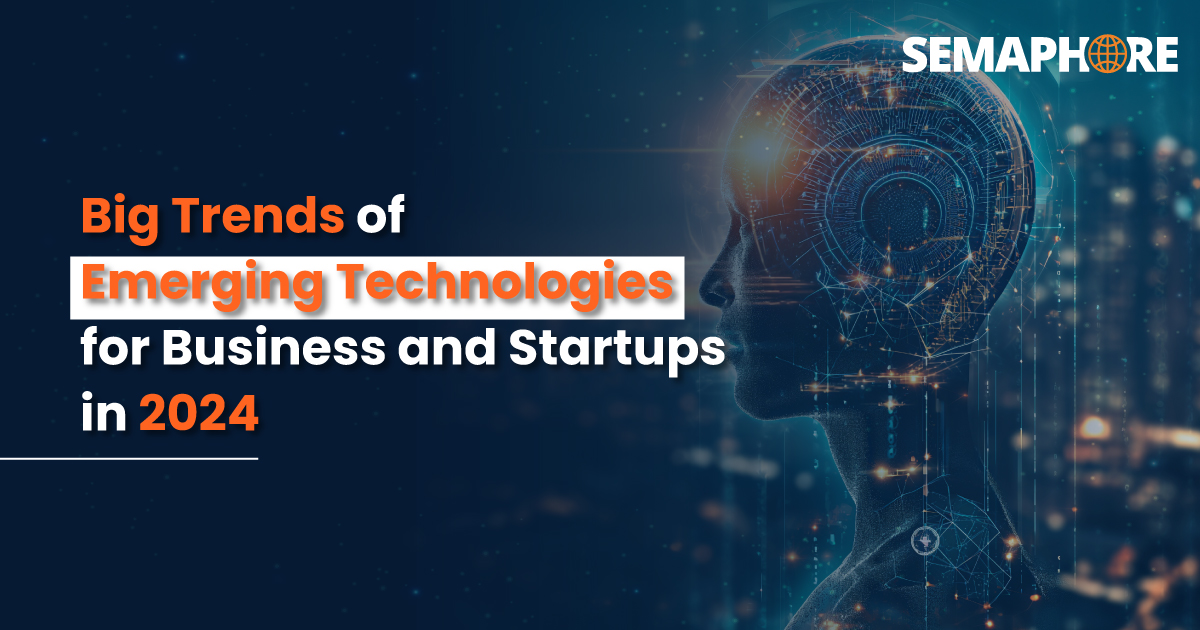Big Trends of Emerging Technologies for Business and Startups in 2024
I. Introduction
Modern businesses face many difficulties in terms of increasing competition, changing expectations, and economic setbacks. Thankfully, emerging technologies lend a helping hand for businesses and startups to survive in this challenging scenario. Be it business innovation or automation, these future-ready technologies always remain useful for startups. In this post, we are going to see the impact of key trends in advancing technologies.
II. Major Trends of Emerging Technologies for Business and Startups

It is no exaggeration to mention that emerging technologies drive the startup ecosystem and make or break it. Let’s go through these trends and their significance for businesses and startups.
-
AI & Machine Learning
Both Artificial Intelligence (AI) and Machine Learning (ML) act as catalysts for startups across categories of retail, education, entertainment, and finance. Both these technologies offer robust tools for automation, data analytics, and personalized experiences. Both AI and ML enable companies to gain deeper data-driven insights and optimize their operations. Enterprises can build innovative products and services based on specific market needs with the help of predictive analytics.
Moreover, enterprises can utilize AI-powered marketing platforms to promote their products and services effectively. Fintech companies can offer smart assistants to resolve queries of their customers rapidly. Personalized recommendations can take retail companies to a new level. In a way, these cutting-edge technologies can bring revolutionary changes in companies across all industry sectors.
-
Cloud Computing
It is an emerging trend that drives other futuristic technologies. The cloud technology gives your organization the necessary scalability and flexibility to grow. You can enhance collaboration and increase accessibility for corporate data on the move with cost-effective cloud-based models. SaaS (System as a Service), PaaS (Platform as a Service), and IaaS (Infrastructure as a Service) are different models of cloud computing that meet diverse business needs effectively. Moreover, you can get a ‘pay as you go’ advantage to save big on infrastructure costs.
We witness cloud-based productivity tools and robust remote data storage facilities. In the coming years when more companies will migrate their data and applications to the cloud, we will have more powerful virtual servers with enhanced storage capabilities.
-
Internet of Things (IoT)
This concept comprises a network of connected devices and smart sensors for communicating and exchanging data. It offers businesses an opportunity to innovate and improve in various departments. Innovative concepts like smart homes, a wide range of wearables, and industrial IoT (IIoT) applications are some examples of IoT trends.
IoT devices can offer real-time data insights for improving the decision-making process and enhancing customer experiences. These insights can also improve operational efficiency over the period and bring automation to decision-making. Startups can leverage IoT technology to bring disruption to their traditional competitors through agile solutions. When it comes to developing scalable and innovative solutions, companies can consider integrating IoT into their software development projects.
-
Blockchain
This distributed ledger technology promotes innovation and enhances security in online transactions. You can establish and nurture new business models with the help of this revolutionary concept. Blockchain is based on decentralization and offers high transparency in any transaction ranging from multicurrency or cryptocurrency. You can increase trust among customers with the help of this robust technology.
Enterprises can utilize blockchain technology in securing supply chain management and smart contracts. Fintech companies can come up with user-friendly and seamless cryptocurrency platforms and digital identity solutions based on blockchain. We will witness innovative models in the future with blockchain, NFTs (Non-fungible Tokens), and other technologies. Retail, BFSI, real estate, and manufacturing sectors are some of the biggest beneficiaries of this trend.
-
Augmented Reality (AR) & Virtual Reality (VR)
How about enhancing visual experience by blurring the lines between the virtual and real worlds? Extended Reality (XR) and Mixed Reality (MR) make it possible for emerging enterprises. Both AR and VR trends have gone beyond gaming and gaining popularity across core industry sectors. Both these trends are useful for offering immersive experiences to customers, enhancing training, and improving product visualization.
One of the biggest roles of AR technology is in establishing remote collaboration and troubleshooting. This domain has a lot of potential in various industry sectors. VR training simulations, virtual showrooms, virtual tours, and AR-powered product manuals will gain ground and evolve with advancing technology soon.
It is interesting to see some real-world examples from the business world that have been transformed with advancements in these technology trends.
III. How Businesses and Startups Thriving with Emerging Technologies
The current age of digital transformation brings new opportunities for businesses and startups. From harnessing the power of AI to leveraging blockchain, advancements in emerging technology break down barriers and create exciting opportunities. Startups, with their inherent agility, are at the forefront of these technologies to disrupt established industries.
Established enterprises, recognizing the need to adapt, are ready to embrace automation, big data analytics, and cloud computing to optimize operations. This tech-driven transformation is about efficiency and reshaping industries ranging from healthcare and finance to entertainment and retail. As businesses and startups continue to integrate emerging technologies, we can expect to see even more groundbreaking solutions emerge.
IV. Concluding Notes
AI, ML, blockchain, AR, and VR are some of the most promising emerging technologies for businesses and startups globally. We will see innovative solutions as per their advanced trends in the corporate world. However, companies need to make effective strategies to leverage the benefits of these advancements and drive growth.
We are an offshore development company serving our esteemed clientele with high-end, enterprise-grade software. We offer a range of IT services in the domains of software development, mobile app development, CMS development, and web development. Do you want to make the most of technological advancements for your company? You can contact us with your project requirements and we will get back to you shortly.
FAQ
Not necessarily! Cloud-based solutions and open-source platforms can reduce the implementation costs for these technologies.
They can partner with renowned software development services providers like Semaphore and focus more on giving the necessary training to employees.
Startups can opt for cloud-based solutions and utilize open-source platforms with the help of a renowned software solutions provider like Semaphore.
No. Futuristic technologies primarily focus on upskilling and complementary roles.
Blockchain technology can bring transparency, traceability, and security across newer business models and online transactions.
Market research and goal identification are the first steps for implementing evolving technologies in your business.
IoT can track assets and predict the maintenance of equipment. It also plays a role in automation to improve operational efficiency.


